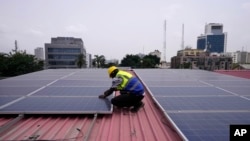Financial support for climate technology startups in Africa from the private sector is growing. Businesses have raised more than $3.4 billion since 2019. However, the continent requires $277 billion each year to meet its climate goals for 2030.
Experts say to receive more money, African countries need to deal with risks such as unexpected currency value changes. And they say investors need to expand into different climate sectors, including flood protection, disaster management and heat management. Investors should also use more kinds of funding methods.
Africa: The Big Deal is a financial support database. It says that last year, climate tech startups on the continent raised $1.04 billion. That is a 9 percent increase from the year before and three times what they raised in 2019. That increase comes as overall money for startups in Africa fell last year.
The money climate tech startups raised last year was more than one-third of all monies raised by startups in Africa in 2023. It came in second to financial technology, a more established sector.
Venture capital is usually given to business with large risk but great long-term growth possibilities. Startups use it to expand into new markets and to get products and services on the market.
Even with the noted growth, private sector financing represented only 14 percent of all of Africa’s climate finance from 2019 to 2020. That information comes from a study by Climate Policy Initiative, a finance and policy research organization.
That number is far lower than in other parts of the world. In East Asia and the Pacific, for example, private sector financing represents 39 percent of climate finance. And in Latin America and the Caribbean, it makes up 49 percent.
Sandy Okoth works at FSD Africa. The non-profit organization receives funding from the British government. Okoth said the low financial support in Africa is linked to investors putting money in areas they are more familiar with, such as renewable energy technology. Less money comes in for “more complex” technology, Okoth said. That includes technology for adapting to climate change, he added.
Wetility is a renewable energy startup based in South Africa. Last year, it secured funding of $48 million, mostly from private equity, to expand its operations.
The startup provides solar panels for homes and businesses and an online service that permits users to remotely access power usage. It aims to solve the problems of energy access and dependability in southern Africa.
Vincent Maposa is founder and chief executive officer of Wetility. He said, “Private sector financing in African climate is still rather low.” But he added that there is clear growth.
Maëlis Carraro is partner at Catalyst Fund. The Kenya-based venture capital fund supports climate adaption solutions. She urged for more diverse funding, such as mixing private and public sector funding together.
She said one aim of public financing should be to bring more private sector capital into financing climate initiatives.
She added, “We need the private sector and the public sector to work together to unlock more financing.”
I’m Gregory Stachel.
Carlos Mureithi reported this story for The Associated Press. Gregory Stachel adapted it for VOA Learning English.
_____________________________________________
Words in This Story
sector – n. an area of an economy
currency – n. the money that a country uses
fund – v. to provide money for (something)
venture capital – n. money that is used to start a new business
adapt – v. to change (something) so that it functions better or is better suited for a purpose
equity – n. a share in a company
solar panels – n. a large, flat piece of equipment that uses the sun's light or heat to create electricity
remotely – adv. from a distance
access – n. a way of being able to use or get something
initiative – n. a plan or program that is intended to solve a problem









Forum